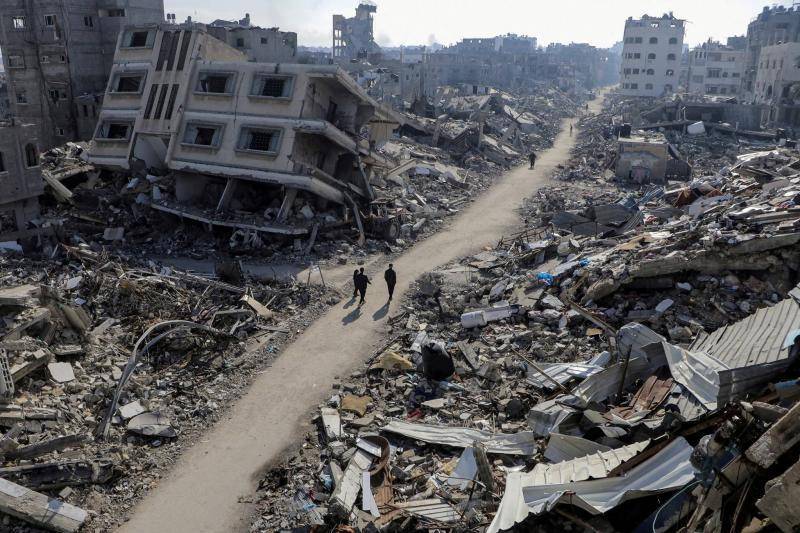After a senior Egyptian source revealed significant progress in the talks ongoing in Cairo regarding a prisoner exchange deal and a ceasefire in the besieged Gaza Strip, confirming that consensus has been reached on key points among all parties, there has been a new development in the file. Another Arab source announced today that the United States is seeking to oblige Hamas and Israel to reach a ceasefire within a few days during the ongoing talks.
The U.S. has requested Egypt and Qatar to pressure Hamas, while Washington is pressuring Israel to reach an agreement for a prisoner exchange and a ceasefire lasting six weeks, according to the Arab World News Agency (AWP). It was also noted that the U.S. proposal in the negotiations between Israel and Hamas includes the numbers and methods for the return of displaced individuals from southern to northern Gaza, as well as the number of prisoners to be released from both sides.
Furthermore, it has been emphasized that the U.S. aims to compel both Hamas and Israel to reach a ceasefire agreement within just a few days. The proposal in the ongoing negotiations includes not only the return of the displaced population but also the number of prisoners to be freed from both sides, as well as proposals regarding the timing for halting reconnaissance flights and ceasing combat. It also encompasses a proposal concerning the hours for stopping surveillance aircraft flights and ceasing fighting, alongside the initiation of negotiations regarding the second and third phases of the ceasefire during the implementation of the first phase.
It has been affirmed that the Israeli withdrawal from urban centers will continue during the ceasefire, with expectations for the announcement of detailed aspects of the U.S. proposal in the coming hours. This comes after a senior source reported that significant advances have been made in the talks surrounding the exchange of detainees and the ceasefire in Gaza, and that there has been agreement on the main points among all parties involved.
According to the source, the round of negotiations in Cairo is making considerable progress in narrowing down viewpoints, and Egypt has reaffirmed its commitment to continue efforts to reach an agreement with noticeable advancements in consensus on many contentious points.
It was explained that the Qatari and Hamas delegations left Cairo after the discussions and will return in two days to agree on the final terms of the agreement, while the U.S. and Israeli delegations are expected to depart within hours as consultations continue regarding the agreement over the next two days.
This comes as mediators hope that the potential ceasefire will come into effect and that the exchange of detainees will commence by the time of Eid Al-Fitr this week. Regarding aid, tents, and mobile homes, the U.S. has not proposed changes due to previous agreements on these issues; rather, Washington's intervention has been limited to the distribution methods of the aid and ensuring it reaches those in need and the overseeing bodies.
It is noted that the return of thousands of displaced persons to northern Gaza remains the primary point of contention between Israel and Hamas for reaching a deal that would allow for a prisoner exchange and ceasefire in the area, as previously mentioned by officials from the U.S., Israel, and Egypt.
Arab intermediaries who participated in the talks earlier disclosed that the Israeli side expressed openness to allow the return of up to 2,000 individuals per day to the north, with most being women and children, according to the Wall Street Journal. Additionally, Israel has stipulated that the return of 60,000 Palestinians should be the maximum allowed, excluding men aged 18 to 50.
In this context, Arab officials clarified that the return of displaced Gaza residents might begin 10 days to two weeks after the implementation of the ceasefire agreement, which would last for six weeks, if it is finally agreed upon. However, those returning would have to pass through Israeli military checkpoints to prevent Hamas fighters from sneaking back into the north, according to Israeli and Egyptian officials.
Conversely, Hamas rejects these conditions and insists on removing checkpoints and ensuring the reunification of families returning to the north, opposing the exclusion of adult males. They also repeatedly demand a permanent ceasefire, the withdrawal of Israeli forces from Gaza, the return of the displaced to their homes, and freedom of movement for Palestinians along with their relief and shelter.
Meanwhile, Hamas awaits a response from its leaders in Gaza, with an Israeli response to the U.S. proposal expected within 48 hours.




